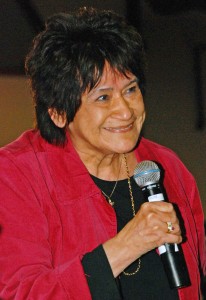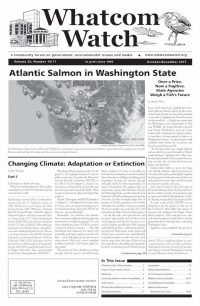by Lorraine Loomis
The backlash against Atlantic salmon farms in western Washington continues to grow as more than 100,000 of the non-native fish remain unaccounted for following the collapse of a Cooke Aquaculture facility in northern Puget Sound last month.
Treaty tribes in western Washington have adopted a policy rejecting Atlantic salmon aquaculture in our region because we believe the state’s permitting requirements, oversight and response planning for Atlantic salmon net pen farming are seriously inadequate.
First Nations in Canada share our concerns about possible impacts from Atlantic salmon to our native Pacific stocks. Bands from Vancouver Island have stepped up their opposition by occupying and calling for removal of some facilities. While Washington has just a handful of farms – California, Oregon and Alaska have banned them – there are more than 70 in British Columbia.
More than 300,000 adult Atlantic salmon being raised by Cooke Aquaculture at its floating farm on Cypress Island escaped when the facility collapsed Aug. 19. Cooke was able to recover about half of the escaped fish. Treaty tribal fishermen and sport anglers removed about 55,000 more. The remainder have since spread throughout Puget Sound and the Strait of Juan de Fuca, the Washington coast and British Columbia.
Since the spill, Washington state government has imposed a moratorium on permits for any new Atlantic salmon farm operations, but we think that’s too little, too late. We want those fish gone as soon as possible.
We also want to make it clear that we will continue to support net pens used for short-term marine rearing of Pacific Salmon or culturing of other species when exercising our tribal treaty rights.
Though scientists say it is unlikely Atlantic salmon could establish themselves in our waters, it’s not impossible. In 1998 juvenile Atlantic salmon found in the Tsitika River on Vancouver Island were found to be the offspring of natural spawning by escaped Atlantic salmon.
We have good reason to be concerned. There’s a long history of fish escaping from fish farms throughout western Washington.
Between 1996 and 1999, more than 500,000 got loose in Puget Sound. In 2003, several hundred were found swimming in Scatter Creek, a tributary to the Chehalis River, after escaping from a private fish farm. In 2006, the Alaska Department of Fish and Game confirmed that Atlantic salmon caught in Cook Inlet came from the same facility. Some scientists say that one out of every 100 Atlantic salmon escape from fish farms in Washington and British Columbia.
We believe Atlantic salmon should be treated like all invasive species. We must remove those that we can, monitor our waters for new infestations, and act quickly to wipe them out.
We are failing to recover Pacific salmon in western Washington because their habitat is being lost faster than it can be restored. We don’t need the additional problems that Atlantic salmon bring to our waters.
______________________________
Lorraine Loomis is chair of the Northwest Indian Fisheries Commission, www.nwifc.org.





























